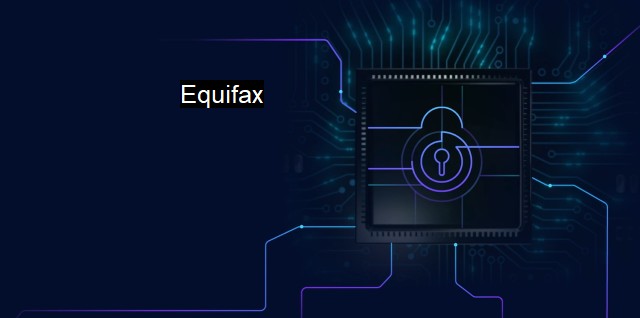What is Equifax?
The Equifax Cyber Attack: A Wake-Up Call for Consumer Data Protection and Cybersecurity
Equifax, a multinational consumer credit reporting agency and one of the three largest American credit agencies along with Experian and TransUnion, is often spoken about in the context of cybersecurity and antivirus due to their expansive data and the influential role they play in the financial lives of consumers (both individuals and businesses) across the globe.Established in 1899 and originally named Retail Credit Company, Equifax accumulates and manages data from over 800 million individuals and 88 million businesses worldwide. The data, which scope from individual’s credit history and financial transactions to business’ financial transactions and performances, are profoundly used for a plethora of purposes from providing credit reports, to aiding in major decisions involved in providing (or denying) credit and services, hence, laying them as prospective targets for cyber threats.
Indeed, like all vast data management companies, Equifax has robust cybersecurity measures in place drawn by multilayered defense strategies, adhering to global regulations and industry best practices. no institution is impenetrable, exemplified by the historic Equifax data breach in 2017 wherein the attackers exposed and exploited the stored personally identifiable information (PII) of approximately 147 million people.
These cyber attackers leveraged a vulnerability in an open-source software package Equifax utilized to build certain online databases. Equifax did have measures in place to combat such attacks, but an oversight left a vital software update not applied, ultimately being exploiting and leading to the worst data breach in history.
The severity of the breach lay in the kind of data exposed and fetched - social security numbers, driver’s license numbers, etc., rendering the victims helpless at the mercy of the attackers who may unethically use the same for nefarious practices like identity theft and fraud.
This massive breach not only served as a wake-up call to companies handling sensitive information, but it also reiterated the critical importance of robust and ongoing cybersecurity practices. Regardless of the size of data that a company handles, a consistent and comprehensive approach to cybersecurity and antivirus measures is paramount.
In dealing with such attacks, Equifax was handed a reassuring whistle, realizing that even archived data ought to be treated with anticipatory defenses. The interconnectedness of their systems meant that the initial attack affected destructively, a warning to other businesses that are likewise interlinked.
Companies across the world, inclusive of Equifax, are subsequently rectifying their oversights by amplifying their investments in their information security and internal technological structures. Equifax now identifies their data systems holistically and networks proactively to cease such discrepancies in their defense mechanisms.
From an individual's perspective, these vast data of intricate details necessitate adequate fortification of their devices. A sturdy antivirus accomplishes the same by fighting these concurring threats of data breach head-on. exhorting strong and unique passwords, enabling two-factor authentication where available, being vigilant when providing their data and signing up for credit monitoring service, etc., scales up the required protection.
The Equifax breach illuminated both internal cybersecurity shortcomings and the pertinence of individual protection. Though Equifax received heavy criticism and a $575 million fine, it became a pivotal point, bringing in more stringent legislations and framework architected towards enhanced cybersecurity enforcement measures both in the U.S and globally, treating data privacy and protection much more seriously.
Indeed, the case stirred individuals and businesses alike, echoing that the threats aren't confined to one target and could befall anyone, thus outlining the importance of extrapolated preventive measures. As we pivot increasingly towards a digital existence, this blemish in Equifax's history is a timely reminder of the growing cyber threats and champions the need for relentless cybersecurity and antivirus protocols.

Equifax FAQs
What happened in the Equifax cybersecurity breach?
In 2017, Equifax experienced a data breach that exposed the personal information of millions of consumers. Hackers were able to access names, birth dates, social security numbers, and other sensitive data.How can I protect myself from the Equifax breach and other cybersecurity threats?
To protect yourself, you should regularly monitor your credit reports and bank accounts for any suspicious activity. Consider using a reputable antivirus software and enable two-factor authentication for your online accounts.What is Equifax doing to prevent another cybersecurity breach?
Equifax has implemented several changes to improve security, including investing in new technology and hiring additional security personnel. The company has also enhanced its data protection protocols and implemented regular cybersecurity training for employees.How can I check if my personal information was affected in the Equifax breach?
Equifax has set up a free tool on their website where you can check if your personal information was part of the breach. You will need to provide your last name and the last six digits of your social security number.Related Topics
Data Breaches Identity Theft Credit Monitoring Intrusion Detection Vulnerability Assessment
| | A | | | B | | | C | | | D | | | E | | | F | | | G | | | H | | | I | | | J | | | K | | | L | | | M | |
| | N | | | O | | | P | | | Q | | | R | | | S | | | T | | | U | | | V | | | W | | | X | | | Y | | | Z | |
| | 1 | | | 2 | | | 3 | | | 4 | | | 7 | | | 8 | | |||||||